Part VIII: Betty Boop's Post-Code Guest Stars
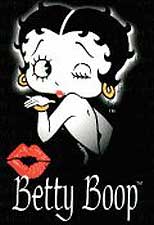 Betty Boop is such an international icon of glamour today that it's odd to realize that even in her heyday she was only moderately successful in the commercial sense.
Betty Boop is such an international icon of glamour today that it's odd to realize that even in her heyday she was only moderately successful in the commercial sense.
Before 1934 when censorship was not as big an issue, Betty's sensuality & ragtime jazz orientation was not to universal tastes, so her cartoons did not penetrate the hinterlands or the South.
But after the 1934 Production Code when she became a blander character more apt to work as a maid or babysitter than vaudeville entertainer, her strengths were unduly undermined.
She had been so close to a giant hit for the Fleischer Brothers that it was difficult for the studio to move on without her. In an attempt to build her fan base among children, who had not been much exposed to Betty the jazz singer, such characters were added to the cast as Betty's pet Pudgy the Puppy, her nephew Junior, or Betty's grandfather the eccentric inventor Grampy. These were frequently the real stars of the films, with Betty receeding to the background of her own films.
Another stunt was to give Betty one-off "guest stars" from the world of the funny pages. Betty's one-off guests included "The Little King," "Henry," & "Little Jimmy" from the sunday funnies. These three guest stars had in common that they were all distributed to newspapers through King Features, as was Popeye the Sailor Man, who would eventually supplant Betty as the Fleischers' number one star.
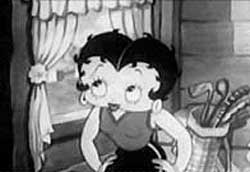 "Little Jimmy" is not remembered today but was once famous, having run in the papers from 1904 until 1858. His past popularity is still felt in many modern comic strips starring rambunctioius little boys. "Little Jimmy" is not remembered today but was once famous, having run in the papers from 1904 until 1858. His past popularity is still felt in many modern comic strips starring rambunctioius little boys.
Betty Boop & Little Jimmy (1936) has Jimmy being visually pretty close to identical to the recurring character of Junior with the cuteness amped up to icky, as if Junior weren't icky enough.
In the papers, Little Jimmy, as created by Jimmy Swinnerton & based on his own childhood, resembling Gahan Wilson's autobiographical childhood strips Nuts. The cartoon character Betty babysits looks nothing at all like the original, but more closely resembles the recurring character of Junior who is sometimes living with Betty for what reasons we never know.
The Fleischers must have seen as a stylistic conflict with their Boop cartoons so they just refashioned Little Jimmy a bit too much of a cupie doll, quite opposed to his funny-pages appearance. In the comic strip, the recurring gag for Jimmy was that he always forgot what he intended to do, & that at least is the same for his Betty Boop guest stint.
As Betty Boop & Little Jimmy begins, we see only Betty, who is in a garret exercise room, doing her exercises under the leaning ceiling, with some sports equipment propped against a bare unfinished wall. As she works out she sings, "Keep your girlish figure, with a lot of exercise/ Shake your hips, & roll your eyes/ stay away from cakes or pies."
The mediocre tune is by Sammy Timberg, who anonymously composed a great many of Betty's lesser songs. Betty is voiced by Ann Rothschild, who gets the Bronxy babyvoice just right, even if Mae Questel had been better.
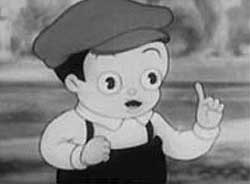 Little Jimmy appears at the far end of the garret which is used as a regular attic storage place with spare furniture, storage trunk, & unhung pictures. He adds his own verse to Betty's song. Little Jimmy appears at the far end of the garret which is used as a regular attic storage place with spare furniture, storage trunk, & unhung pictures. He adds his own verse to Betty's song.
He hops upon a robot horse which bucks when you turn it on. Thrown across the room, he lands on the handle that turn's Betty's exercise device on to high, & she can't get out of the vibrator-belt. She shouts for Jimmy to "Quick! Get an electrician!" so he rides an ironing board down the staircase at top speed & out the door.
"I've got to get an electrician! An electrician!" he reminds himself, but is soon playing in the slummy streets experiencing a number of sight gags. When he tries to remember what he was supposed to do, it comes out "Gotta get an optition! No. I gotta get a magician for Betty. A magician."
While Betty's getting the living daylights shaken out of her, Jimmy is again sidetracked by all the cool stuff in the garbage-strewn street. The filth of the urban setting is intriguing. The Great Depression was over & the New Deal was in place, but this film without overt commentary assumes poverty & decay is the urban norm.
Jimmy's best gag is when he removes two springs from a rotten mattress in the street, attaches them to his shoes, & bounces around town for a while. In the process he goes from "remembering" he was supposed to find a Politician for Betty, to remembering it was a Musician.
He makes it back to Betty's work-out room with nobody, & laughs to see she's now thin as a stick & dripping sweat, but has at least escaped the belt-shaking device on her own.
Betty think's it's pretty funny herself, & the shaking device comes alive to add to the laughter, as does the chair in the corner of the attic, & an old grandfather clock as well as Jimmy's electric hobby horse, all the stuff in the attic laughing.
For a totally irrational climax, Betty & Jimmy are shown inexplicably to have become enormously fat (apparently laughter is fattening) as they reprise a verse from the earlier song.
Better than average for a late-occurring Betty episode, even Little Jimmy is interesting (compared to Junior). Betty shows a bit more skin than in most of the post-Code episodes; the animators may have shown her in her exercise room as an "excuse" for getting her out of the knee-length skirts the 1034 Production Code generally required. Plus, it's fun to see her fat.
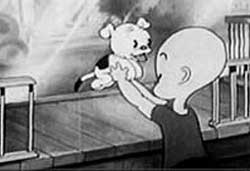 The point of Betty's guest stars was to increase her acceptibility by parents as a children's cartoon character. The Fleischers had frankly targetted adult audiences during Betty's earlier film career, but over time cartoons had become increasingly assumed to be for the kiddies.
The point of Betty's guest stars was to increase her acceptibility by parents as a children's cartoon character. The Fleischers had frankly targetted adult audiences during Betty's earlier film career, but over time cartoons had become increasingly assumed to be for the kiddies.
"Henry" was another child star of the funny pages. He was a pantomime character (as was "the Little King"), so even preschoolers with no reading skills could "read" Henry's strips, & foreign newspapers were able to pick up the strip without need of a translator.
He was created in 1932 by Carl Anderson, & continued under ghost writers & other artists long after Carl was gone, & the last new strips were done in 2005.
Henry was once a popular American comics character. With a few exceptions from his earliest strips, Henry was nearly always completely silent. But in Betty Boop with Henry, the Funniest Living American (1935) he does speak a bit, with Mae Questal providing his voice as well as Betty Boop's. He's otherwise the familiar Henry, a bald little kid who offers no explanation for where his hair went.
The film starts off with a couple of sight-gags of the type for which Henry's character was famed. Then while walking along the sidewalk, he arrives at Betty Boop's Pet Shop, spotting a puppy in the window.
Inside the shop Betty is singing, "Everybody ought to have a pet. A little dog bow-wow, a little cat meow. When you're feeling terribly upset, you can bet you need a pet," & so on. She has a duster instead of a pooper scooper & dances around the place dusting the animals.
"I wanna buy that dog," says Henry, to which Betty says, "Why Henry, Pudgy costs two dollars." Seems a bit callous that Betty would be selling her own personal dog, star of a number of other Betty Boop episodes, but let's say he's just "an acting dog" & isn't really being sold.
Downcast because he can't afford to buy Pudgy, Henry is leaving, but Betty takes pity on him. She has errands to run anyway, & offers to give him Pudgy if he'll watch the store until she gets back.
Henry feeds the birds by dumping seed on his bald head & letting them peck it off. He then begins to teach Pudgy tricks. But he's not paying attention to the birds, which all get outside. Betty returns so unhappy to find the birds have escaped that she won't give him Pudgy after all.
Betty's on the sidewalk begging her birds to return to the petshop, & when they won't come, she bursts out weeping. Henry saves the day by dumping birdseed on his head, & all the birds fly down to peck his pate, & he's earned Pudgy after all.
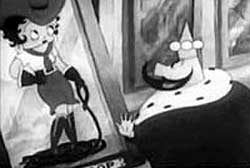 At a special performance for his majesty the king, but the big-busted gal caterwalling lousy opera bores the Little King, who sneaks out of the theater & heads down to the burlesque house, where Betty Boop is performing, in Betty Boop & the Little King (1936).
At a special performance for his majesty the king, but the big-busted gal caterwalling lousy opera bores the Little King, who sneaks out of the theater & heads down to the burlesque house, where Betty Boop is performing, in Betty Boop & the Little King (1936).
Betty's vaudeville/burlesque career was one of the things most often censored from her life in this post-code era, & it's a relief to see that in 1936 she was still an entertainer rather than a babysitter or petshop owner. Her act is designed to be as unsexy as possible, however, & gone are the fine jazz numbers.
Betty does a cowgirl act on stage, complete with trained horse, singing "Yippy Yai Yo, Yippy Yai Yo, carry a rope around wherever you go." Before the Production Code of 1934 she would've been a racy jazz singer with her garter showing but now she just rides a horse & gets upstaged by other characters, in this case by the Little King.
The Little King comes on stage asking if he can ride the nice horse. He does a few riding stunts then gives the horse his turn riding on the king. Although the Little King speaks with Betty, in the ten 1933/34 Little King cartoons from the Van Beuren Studios he was silent, & in the comic strip he never spoke.
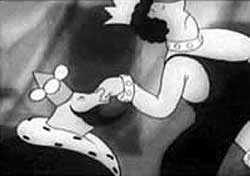 Meanwhile at the boring opera, the Big Bossy Queen belatedly realizes the Little King is gone & demands he be found. The Big Queen shows up at the burlesque & leads the king away by the nose, but secretly Betty's riding to the palace on the running board & still holding the Little King's hand. Meanwhile at the boring opera, the Big Bossy Queen belatedly realizes the Little King is gone & demands he be found. The Big Queen shows up at the burlesque & leads the king away by the nose, but secretly Betty's riding to the palace on the running board & still holding the Little King's hand.
This one's a so-so outing for Betty, although pretty good for the Little King. It's strange to realize now that the Little King would have a longer career than Betty, his long-running comic strip lasting until Otto Sogolow's death in 1975, having been created by otto Soglow in 1931. The lasting power of the character is a little hard to explain as he never made huge inroads into popular culture but was just there at the fringes decade after decade.
There was a lot of Little King merchandising & also the now-forgotten Little King franchise delis. His association with food was part of his character; at the burlesque house with Betty, he buys up all the pretzles from the aisle-vendor in order to resell them himself.
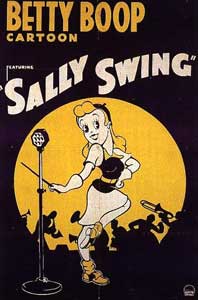 A guest-star with Betty who was not a King Features character was Sally Swing (1938) whose very nature tended to show-up how old-fashioned Betty had become, with fashion for hair, clothing, & even song changing so radically since her jazz-age rise to fame. A guest-star with Betty who was not a King Features character was Sally Swing (1938) whose very nature tended to show-up how old-fashioned Betty had become, with fashion for hair, clothing, & even song changing so radically since her jazz-age rise to fame.
Betty appears to be a consultant the science school of a major university. Turns out she's helping with the school's plans for a swing dance that very night & only just now getting round to auditioning for a band leader, singer, & dancer.
The acts who try out include a bad piano player, a bad singer, a bad ventriloquist, two bad dancers, & a magician who pulls a duck out of his jacket which says, "You wanna buy a duck?" with Donald Duck's voice, spoofing Donald who was the second most popular cartoon character in the world at that time.
The school's maid is a jitterbug dancer, a Cinderella type who Betty puts in a short skirt & makes the band leader, introducing her as Sally Swing, the name of a her song.
The animation of the jitterbug dance is very nicely done. Betty, however, joins the dance at the tail end, wearing a long conservative granny-dress. So Sally, possibly patterned after Betty Grable, remains the star of this episode, with the more dynamic talent.
It's odd that Betty wasn't the singer herself, but this is definitely a jitterbug song rather than ragtime, & Sally is an Andrew Sisters type. To an extent the creation of Sally for this number was an admission that the Fleischers were thinking of flapper Betty as unable to adapt to the new musical sounds.
The Fleischers already knew Betty was being phased out of production, & likely Sally was intended as a replacement for a series of cartoons featuring the new jitterbug swing sound, but never went further. Short though Sally's career was, she may have been an inspiration to Tex Avery who animated jitterbug girls during the following years.
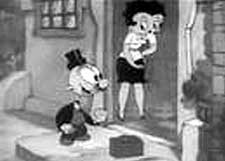 By far the most obnoxious of Betty's guest-stars was Mr. Wiffle Piffle, who takes over two Boop cartoons. He's The Hot Air Salesman (1937) as a door to door salesman, rightly abused at door after door, until he reaches the door of gentleheared Betty.
By far the most obnoxious of Betty's guest-stars was Mr. Wiffle Piffle, who takes over two Boop cartoons. He's The Hot Air Salesman (1937) as a door to door salesman, rightly abused at door after door, until he reaches the door of gentleheared Betty.
He has a big round head, little tiny tophat, rubbery limbs, & habit of leaning far to the left or far to the right if he's going around a corner. He sings an endearing shy song at Betty's door, "Would you like the chance to feast your eyes/ Upon my stock of merchandise/ You'll say yes if you are wise," & Betty adds, "Nothing today kind sir."
He persists with a new lyric that offers among other things rubber nails, & Betty again replies "Nothing today kind sir." So he goes around to Betty's side door for a third verse, offerings including brand new antiques or a sieve that never leaks, earning himself another nothing today kind sir. He then tries the back door & Betty caves & lets him in.
He shows her his new improved mouse trap which is a robot cat with billy-club; his bestselling spot remover which cuts the spot out of the cloth; a rocket-powered automatic clothesline; & so on. He makes a terrible mess, destroys all Betty's stuff, then is packed off on his way without a sale. It's all more a frustration than a good joke, once the clever song is finished.
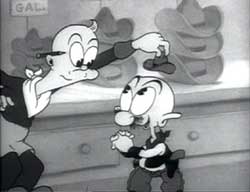 The horrid Wiffle Piffle is back in Whoops! I'm a Cowboy (1937). Betty's putting away office supplies when Wiffle Piffle, at his drawing board, starts thinking about making time with her.
The horrid Wiffle Piffle is back in Whoops! I'm a Cowboy (1937). Betty's putting away office supplies when Wiffle Piffle, at his drawing board, starts thinking about making time with her.
"Betty, will you marry me?" "No!" she exclaimed. "Why?" the little shit wants to know. "Because!" And Betty begins singing, "I Want a Cowboy for a Sweetheart."
Wiffle Piffle sets out to become a cowboy. He attends a Dude Ranch to learn the ropes. He's given a half-pint cowboy hat & other cowboy clothes & a booklet on how to be a cowboy. The instructions for how to cow-punch is to duck before the cow punches back.
A series of really lame gags follow as Wiffle Piffle fails at the cowboy life. The book is his instructor to keep the animation minimal.
Betty's totally out of the picture through all this, & lacks even a closing scene to bring the dull tale full circle. Wiffle Piffle just isn't interesting enough to sustain a show.
copyright © by Paghat the Ratgirl
|
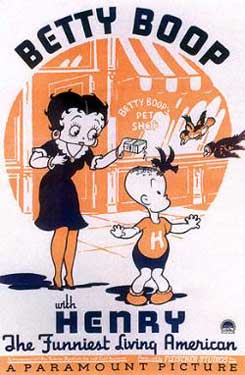


 Little Jimmy appears at the far end of the garret which is used as a regular attic storage place with spare furniture, storage trunk, & unhung pictures. He adds his own verse to Betty's song.
Little Jimmy appears at the far end of the garret which is used as a regular attic storage place with spare furniture, storage trunk, & unhung pictures. He adds his own verse to Betty's song.

 Meanwhile at the boring opera, the Big Bossy Queen belatedly realizes the Little King is gone & demands he be found. The Big Queen shows up at the burlesque & leads the king away by the nose, but secretly Betty's riding to the palace on the running board & still holding the Little King's hand.
Meanwhile at the boring opera, the Big Bossy Queen belatedly realizes the Little King is gone & demands he be found. The Big Queen shows up at the burlesque & leads the king away by the nose, but secretly Betty's riding to the palace on the running board & still holding the Little King's hand.

